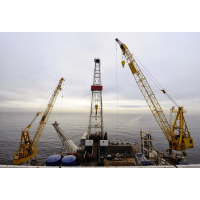EPA Finally Asks Fracking Companies to Self-Report Which Toxins Are Dumped in the Ocean
 Ocean fracking platform (photo: Chris Carlson, AP)
Ocean fracking platform (photo: Chris Carlson, AP)
The U.S. Environmental Protection Agency (EPA) is cracking down on oil companies using the controversial practice of hydraulic fracturing, better known as fracking, in ocean waters off the coast of Southern California.
No, the agency isn’t banning fracking or ordering a moratorium while it studies the effects of pumping large amounts of pressurized water, sand and toxic chemicals into the ground to reach oil otherwise inaccessible to drillers.
A new regulation published Thursday by the EPA merely requires the oil companies to self-report what they have only recently been discovered doing in sensitive waters where new drilling has been banned since a devastating 1969 oil spill near Santa Barbara. The changes are part of a new permit, effective March 1, for water pollution discharges from offshore oil and gas operations in federal waters off California.
The Associated Press reported in August last year that it had discovered more than 200 previously unpublicized instances of fracking at vulnerable offshore sites using existing wells. State officials denied any knowledge of the ocean fracking, which took place at six sites over two decades. The news service used public records to identify the drilling in waters off Long Beach, Seal Beach and Huntington Beach. The AP report amplified an online story by Truthout the month before that detailed two of the fracking operations.
The Environmental Defense Center said it had identified Platform Gail, in federal waters of the Santa Barbara Channel, as one of the fracking sites it had discovered. The site is near Channel Islands National Marine Sanctuary and Anacapa Island, and has a long history of spills, the center said.
Although fracking has been used in a limited fashion across the country for decades, it has only recently been receiving attention as energy companies attempt to reinvigorate depleted oil and gas wells using new technology. It is coming under increased scrutiny in California as the state ponders tapping the Monterey Shale in Central California, a repository of oil that could top 15.3 billion barrels and may represent 60% of all shale oil in the country.
About 20% of fracking materials injected into the ground come back up as wastewater. On land, that dubious product is slammed back into the ground in a separate wastewater well. At sea, a lot of that wastewater is dumped back into the ocean, according to the Center for Biological Diversity:
“Approximately half the oil platforms in federal waters in the Santa Barbara Channel discharge all or a portion of their wastewater directly to the ocean, according to a California Coastal Commission document. This produced wastewater contains all of the chemicals injected originally into the fracked wells, with the addition of toxins gathered from the subsurface environment.”
When the state finally decided to do something about hydraulic fracturing last year, it passed Senate Bill 4, legislation that allows fracking to continue unabated until 2015 while regulations are drafted. A mandated statewide environmental impact report on the practice isn’t due until July 2015. And while it does require frackers to reveal what toxic materials they are injecting into the ground, they can keep secret details on the mix of the toxic brew.
Fracking has been linked to groundwater contamination, air pollution, releases of methane gas, micro-earthquakes and sinkholes.
-Ken Broder
To Learn More:
EPA Begins Requiring California Oil Companies to Report Fracking Chemical Discharges in Federal Waters (Center for Biological Diversity)
EPA to Require California Fracking Reports (by Jason Dearen and Alicia Change, Associated Press)
More Offshore Fracking Discovered in Southern California Waters (by Ken Broder, AllGov California)
While Fracking on Land Comes Under Fire, Energy Companies Quietly Do It Offshore (by Ken Broder, AllGov California)
National Pollutant Discharge Elimination System Permits (Environmental Protection Agency)
- Top Stories
- Unusual News
- Where is the Money Going?
- Controversies
- U.S. and the World
- Appointments and Resignations
- Latest News
- Trump Renames National Football League National Trump League
- Trump to Stop Deportations If…
- Trump Denounces World Series
- What If China Invaded the United States?
- Donald Trump Has a Mental Health Problem and It Has a Name






Comments